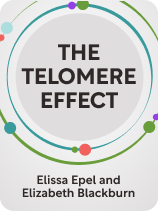

This article is an excerpt from the Shortform book guide to "The Telomere Effect" by Elissa Epel and Elizabeth Blackburn. Shortform has the world's best summaries and analyses of books you should be reading.
Like this article? Sign up for a free trial here.
What are ways to increase telomerase? Why is it good to boost your telomerase levels?
Elizabeth Blackburn and Elissa Epel say that most cells can divide about 50 times before entering senescence in a process called the Hayflick Limit. However, an enzyme called telomerase can rebuild telomeres, allowing cells to bypass the Hayflick Limit.
Continue reading to learn how to increase telomerase levels.
The Good News: Telomerase Rebuilds Telomeres
Unfortunately, much like your cells, your telomerase doesn’t keep working forever. Telomerase becomes less active as you get older, and eventually, it can’t keep up with your cells anymore. This inevitably leads to senescence and the health issues that come with it.
The authors add that at this point, it might seem reasonable to learn how to increase telomerase levels artificially to prevent or cure aging. However, they warn that this method could lead to totally unchecked cell division—in other words, cancer. Therefore, the best way to maximize your years of health is to boost your telomerase as much as you can using natural methods. This will help you avoid the telomerase overdose that triggers cancer.
Blackburn and Epel say that you can boost your telomerase levels and maintain your telomere health by living a wellness-focused lifestyle. In this section, we’ll examine a number of the authors’ suggestions for protecting your telomeres and, in turn, your health. These strategies include:
- Getting regular exercise
- Eating a healthy diet
- Developing good sleep habits
- Living in a clean environment
- Developing a more optimistic mindset
| Another Anti-Aging Theory: Yamanaka Factors Boosting telomerase is one theory about how to extend a person’s life and health, but there are others. For instance, according to biologist David Sinclair (Lifespan), the true cure for aging may lie in a set of four genes called Yamanaka factors. Discovered by researcher Shinya Yamanaka, Yamanaka factors have the potential to reverse cell aging by reverting adult cells to immature stem cells. Those stem cells can then re-mature into young, healthy cells of any type. Sinclair believes that these Yamanaka factors, combined with other treatments, could one day be used to revert senescent cells into healthy ones, essentially resetting people’s biological clocks. Unfortunately, like telomerase, Yamanaka factors can contribute to cancer. In fact, some research suggests that these genes are—at least in part—why cancer cells are so hard to kill, and why cancer so frequently comes back after going into remission. |
Telomerase Booster #1: Regular Exercise
Blackburn and Epel say that regular exercise lowers your blood pressure and minimizes your risk of stroke, diabetes, and other aging-related diseases like dementia. They add that you don’t need an intense workout regimen to see these benefits: A moderate exercise plan, such as going for a 45-minute walk or jog three times a week, goes a long way toward preserving your telomeres. However, the authors recommend aerobic endurance exercises or high-intensity interval training (HIIT) for maximum effect.
| How Much Exercise Do You Really Need? While walking or jogging a few times a week is certainly beneficial, the authors may be understating how much additional benefit you can get from exercising more than that. Some studies have found that working out two to four times more than the minimum recommendations reduces the risk of death at any particular age by about a third. In simpler terms: The more you exercise, the longer you’ll live. The anti-aging effects of aerobic exercise continue to work no matter how old you are. That said, seniors may find it difficult to exercise regularly without injuring themselves, thereby doing more harm than good. To help avoid that problem, there are many exercise programs geared toward older adults, such as aquatic yoga classes. It’s also worth noting that vigorous exercise, such as high-intensity interval training, produces similar effects to moderate exercise (like walking or lifting weights) in just half the time. For example, in 2018, the American Medical Association recommended that adults do 150-300 minutes of moderate activity each week or 75-150 minutes of vigorous activity. |
Telomerase Booster #2: Healthy Eating
When it comes to telomeres and cellular longevity, it’s your metabolic health that matters, not your weight. Blackburn and Epel say that common symptoms of poor metabolic health—like excess belly fat, abnormal cholesterol levels, high blood pressure, and insulin resistance—often go hand in hand with telomere damage. Therefore, the authors suggest that rather than fixating on losing weight through stressful methods like harsh diets, you should take a more holistic and sustainable approach to your metabolic health.
Protecting your metabolism (and therefore your telomeres) means adopting a prudent eating regimen that bolsters your overall well-being, instead of a short-term diet that just burns fat. A telomere-friendly diet relies heavily on fresh fruits and vegetables for nutrients, while incorporating whole grains for sustained energy. To round out this diet, the authors recommend using nuts and fish as healthy sources of protein.
(Shortform note: A diet rich in vegetables and whole grains offers benefits beyond just metabolic health—it’s also advantageous for oral health. In Jaws, orthodontist Sandra Kahn and biologist Paul R. Ehrlich explain that ancient humans actually had healthier mouths than modern humans do. The authors say this is because ancient humans used their teeth for rigorous tasks like tearing raw meat and grinding up uncooked vegetables. This intensive usage led to the development of larger jaws and stronger teeth, which naturally protected them from many of the dental issues we face today, such as malocclusion and tooth decay. Conversely, our modern diets of soft, processed foods leave us with underdeveloped jaws and weak teeth.)
Finally, the authors say that it’s crucial to reduce your sugar intake—refined sugars not only cause you to gain weight, they also contribute to metabolic conditions such as diabetes. For instance, most fruit juices and sodas deliver shocking amounts of sugar per glass. If you commonly drink these unhealthy beverages, try replacing them with flavored seltzer.
(Shortform note: Are artificial sweeteners like aspartame and sucralose better than refined sugar? This has long been a source of controversy, with debates over artificial sweeteners’ potential health impacts. However, the Food and Drug Administration (FDA) and food safety agencies in numerous countries have evaluated the available scientific evidence and concluded that these food additives are safe for most people when consumed in limited quantities. Therefore, artificial sweeteners can serve as healthier alternatives to refined sugar for those seeking to reduce their intake of added sugars and calories.)
Telomerase Booster #3: Good Sleep Habits
Blackburn and Epel highlight the fact that a good night’s sleep is not a luxury, but rather a vital component in maintaining the health of your telomeres. Research suggests that individuals grappling with chronic sleep issues tend to have shorter telomeres compared to those who regularly get sufficient rest.
The authors recommend getting at least seven hours of sleep each night. However, they add that good sleep habits aren’t just about how long you sleep; how well you sleep matters too. For instance, if you’re constantly drifting in and out of sleep because noises outside keep waking you up, you—and your telomeres—won’t get the full benefit of a good night’s rest.
Telomerase Booster #4: A Healthy Environment
Finally, Blackburn and Epel say that environmental factors can have significant impacts on your telomeres, for better or worse. Here are a few suggestions to create a healthier environment:
Greenify your space. Fortifying your living space with greenery not only beautifies your surroundings, but also serves as a natural bulwark against airborne toxins like those found in car exhaust.
Go natural. Embracing all-natural alternatives to common household cleaners and cosmetics helps minimize your contact with dangerous substances like bleach and formaldehyde—remember, environmental toxins damage your telomeres and shorten your healthy years. For example, scrubbing with baking soda is a safe and effective way to clean everything from oven racks to toilets without the need for any toxic chemicals.
Find substitutes for plastic. Drinking from plastic bottles or microwaving meals in plastic containers exposes you to harmful chemicals like bisphenol A (BPA), thereby endangering your health and your telomeres. So, using containers made of glass or other non-plastic materials will help you stay healthier for longer.
| Many People Can’t Afford a Healthy Lifestyle When discussing healthy lifestyle choices, we must acknowledge that for many people—particularly those with low incomes—such choices aren’t an option. First of all, going out into nature (or bringing nature into your home, as the authors suggest) isn’t as easy as it sounds for many people. For instance, one study found that 70% of impoverished communities in the United States don’t have easy access to places like parks or nature preserves. Furthermore, for people who are already struggling to make ends meet, spending money on plants—not to mention the time and effort to take care of them—is out of the question. Second, sticking to all-natural products can be time-consuming and difficult. While it may be cheaper to use natural cleaning products, they can require more elbow grease—and thus, time and energy—to achieve the same results as chemical household cleaners. Going natural may also be more expensive, especially when it comes to food. In Ultra-Processed People, doctor Chris van Tulleken explains that impoverished urban areas are often lined with unhealthy fast food restaurants and have grocery stores filled with what he calls ultra-processed food: cheap foods loaded with unhealthy additives that sicken the people who rely on them for nourishment. Finally, impoverished people often have to buy single-use items wrapped in plastic, called sachet packaging, because they simply can’t afford to buy products in larger quantities. For people in such desperate straits, looking for products with alternative packaging like glass or cloth is simply out of the question. |
Telomerase Booster #5: Optimism
Finally, Blackburn and Epel urge you to work toward a more optimistic mindset, especially when it comes to facing life’s challenges. Instead of dwelling on problems or treating them as insurmountable, optimists view difficulties as temporary hurdles on the path to their goals. They perceive challenges as opportunities for growth, rather than as threats. For instance, if you lose your job, it would be natural to fall into a pessimistic mindset of thinking that you’ll never find another job that good, never make as much money as you were making, or that you’ll lose your home before finding another job. However, an optimist would instead see this challenge as a chance to find an even better job and progress their career with a new employer.
However, the authors add, optimism doesn’t mean that you ignore negative feelings or experiences; it means you acknowledge them, but don’t let them define you or your future. This kind of mindset helps reduce stress and promotes mental well-being, which in turn keeps your cells strong and healthy for as long as possible.

———End of Preview———
Like what you just read? Read the rest of the world's best book summary and analysis of Elissa Epel and Elizabeth Blackburn's "The Telomere Effect" at Shortform.
Here's what you'll find in our full The Telomere Effect summary:
- Why people suffer the effects of old age
- How negative thinking and social isolation speed up the aging process
- Specific habits you can adopt to stay young longer






